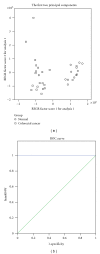Urine Metabolite Profiling of Human Colorectal Cancer by Capillary Electrophoresis Mass Spectrometry Based on MRB
- PMID: 23243419
- PMCID: PMC3518074
- DOI: 10.1155/2012/125890
Urine Metabolite Profiling of Human Colorectal Cancer by Capillary Electrophoresis Mass Spectrometry Based on MRB
Abstract
Aim. The study was to investigate the metabolic profile of urine metabolites and to elucidate their clinical significance in patients with colorectal cancer. Methods. Colorectal cancers from early stage and advanced stage were used in this study. Urine samples of colorectal cancer patients and healthy adults were collected and subjected to capillary electrophoresis mass spectrometry based on moving reaction boundary analysis. The metabolic data were analyzed by SPSS 17.0 to find urinary biomarkers for colorectal cancer. Results. The results indicated that the urine metabolic profiling of colorectal cancer patients had significant changes compared with the normal controls, and there were also differences between early stage and advanced colorectal cancer patients. Compared with the control group, the levels of isoleucine, valine, arginine, lactate acid and leucine increased (P < 0.05), but those of histidine, methionine, serine, aspartic acid, citric acid, succinate, and malic acid decreased in urine samples from colorectal cancer (P < 0.05). Furthermore, the levels of isoleucine and valine were lower in urine of patients with advanced colorectal cancer than those in early stage colorectal cancer (P < 0.05). Conclusion. The technique of capillary electrophoresis mass spectrometry based on MRB could reveal the significant metabolic alterations during progression of colorectal cancer, and the method is feasible and may be useful for the early diagnosis of colorectal cancer.
Figures




Similar articles
-
Ion chromatography based urine amino Acid profiling applied for diagnosis of gastric cancer.Gastroenterol Res Pract. 2012;2012:474907. doi: 10.1155/2012/474907. Epub 2012 Jul 25. Gastroenterol Res Pract. 2012. PMID: 22888338 Free PMC article.
-
CE-MS based on moving reaction boundary method for urinary metabolomic analysis of gastric cancer patients.Electrophoresis. 2014 Apr;35(7):1032-9. doi: 10.1002/elps.201300243. Epub 2013 Oct 1. Electrophoresis. 2014. PMID: 23900894
-
Bile Metabolites and Risk of Carcinogenesis in Patients With Pancreaticobiliary Maljunction: A Pilot Study.Anticancer Res. 2021 Jan;41(1):327-334. doi: 10.21873/anticanres.14779. Anticancer Res. 2021. PMID: 33419827
-
Urinary charged metabolite profiling of colorectal cancer using capillary electrophoresis-mass spectrometry.Sci Rep. 2020 Dec 3;10(1):21057. doi: 10.1038/s41598-020-78038-2. Sci Rep. 2020. PMID: 33273632 Free PMC article.
-
Searching for urine biomarkers of bladder cancer recurrence using a liquid chromatography-mass spectrometry and capillary electrophoresis-mass spectrometry metabolomics approach.J Chromatogr A. 2013 Nov 29;1318:163-70. doi: 10.1016/j.chroma.2013.10.002. Epub 2013 Oct 4. J Chromatogr A. 2013. PMID: 24139504
Cited by
-
Capillary Electrophoresis-Mass Spectrometry for Cancer Metabolomics.Adv Exp Med Biol. 2021;1280:189-200. doi: 10.1007/978-3-030-51652-9_13. Adv Exp Med Biol. 2021. PMID: 33791983
-
Associations of branched-chain amino acids with parameters of energy balance and survival in colorectal cancer patients: Results from the ColoCare Study.Metabolomics. 2018 Mar;2018(14):22. doi: 10.1007/s11306-017-1314-8. Epub 2018 Jan 31. Metabolomics. 2018. PMID: 29706852 Free PMC article.
-
Correlation analysis of urine metabolites and clinical staging in patients with ovarian cancer.Int J Clin Exp Med. 2015 Oct 15;8(10):18165-71. eCollection 2015. Int J Clin Exp Med. 2015. PMID: 26770415 Free PMC article.
-
Effects of bowel preparation on intestinal bacterial associated urine and faecal metabolites and the associated faecal microbiome.BMC Gastroenterol. 2022 May 13;22(1):240. doi: 10.1186/s12876-022-02301-1. BMC Gastroenterol. 2022. PMID: 35562657 Free PMC article.
-
Urine-NMR metabolomics for screening of advanced colorectal adenoma and early stage colorectal cancer.Sci Rep. 2019 Mar 18;9(1):4786. doi: 10.1038/s41598-019-41216-y. Sci Rep. 2019. PMID: 30886205 Free PMC article.
References
-
- Chan ECY, Koh PK, Mal M, et al. Metabolic profiling of human colorectal cancer using high-resolution magic angle spinning nuclear magnetic resonance (HR-MAS NMR) spectroscopy and gas chromatography mass spectrometry (GC/MS) Journal of Proteome Research. 2009;8(1):352–361. - PubMed
-
- Qiu YP, Cai GX, Su MM, et al. Urinary metabonomic study on colorectal cancer. Journal of Proteome Research. 2010;9(3):1627–1634. - PubMed
-
- Jemal A, Siegel R, Xu J, Ward E. Cancer statistics, 2010. CA Cancer Journal for Clinicians. 2010;60(5):277–300. - PubMed
-
- Ikedaa A, Nishiumi S, Shinoharab M, et al. Serum metabolomics as a novel diagnostic approach for gastrointestinal cancer. Biomedical Chromatography. 2012;26(5):548–558. - PubMed
-
- Rajdev L. Treatment options for surgically resectable gastric cancer. Current Treatment Options in Oncology. 2010;11(1-2):14–23. - PubMed
LinkOut - more resources
Full Text Sources

